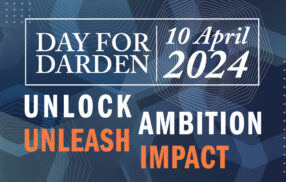Rachael McConnell (MBA ’14) was eager to spend last summer working on marketing and brand management for Jaali Bean, a start-up in Chicago that makes Indian cuisine more accessible by providing kits for preparing delicious Indian food at home. “I had worked in the tech industry and had a feel for tech start-ups,” McConnell says. “Learning about a completely different industry was exciting. I was looking for an opportunity to learn as much as possible and see a different side of business than I was used to.”
“The summer between the first and second years of the MBA program is often a time for students to take a calculated risk, to do something new,” says Amanda Panarese, the assistant director for career education and advising at the Darden School. As part of her role, Panarese oversees the Batten Venture Internship Program, through which McConnell found her internship with Jaali Bean.
The program, supported by the Batten Institute, makes it possible for resource-constrained start-ups to hire student interns by splitting the cost of the summer stipend. The young companies get access to talented professionals; the Darden students get a breadth and depth of experience that many other summer opportunities can’t offer. Since 2002, more than 220 students have found internships through the program. Participation has been particularly strong in recent years, signaling an increased interest in start-ups and a growing understanding of the value of entrepreneurial skills.
Students interested in pursuing an internship through the program can browse on a Darden website where start-ups post positions. Some of the companies looking for summer help are close to home, such as a spinoff from the U.Va. Health System; some have been started by Darden alumni, including Jaali Bean, which was cofounded by Brian Junkins (MBA ’02). But many non-U.VA.-affiliated start-ups, both domestic and international, post positions.
Students who don’t find exactly what they’re looking for on the site can create their own opportunities. Rafael Barbosa (MBA ’15), who’s interested in venture capital, did this by tapping his network and making a lot of cold calls. He finally landed an internship in the recently opened Sao Paulo office of Bessemer Venture Partners, where he’ll be exploring deals in a brand new market for the firm. He’s hoping this internship will give him an inside view of the industry and help him start building a network in his home country, where he plans to return after graduation.
Lydia Kim (MBA ’15) also pursued her BVIP internship with a clear goal in mind: gaining experience that she can translate to a career as an investor in entrepreneurial ventures. “I could have chosen the traditional investment banking route,” she explains, “but instead I decided to go the operational route, to see how a small business works and how it grows.” She’ll spend the summer in Boulder, Colorado, working for the social data provider Gnip. Kim expects to be working on the company’s growth strategy and channel partnerships as it strengthens its global business development. The exact details of her internship are uncertain, however, in light of Twitter’s announcement in April of an agreement to purchase Gnip-a reminder, Kim notes, that when you work at a start-up you must be ready for anything.
BVIP internships are often appealing to students who are interested in entrepreneurship but aren’t yet sure what role is right for them. “I didn’t have an idea for a venture of my own,” says Ares Manos (MBA ’14), “but I like working in small teams, and I wanted to see how you build a business.” He spent last summer interning for Gigdog, a venture in U.Va.’s i.Lab Incubator. Manos helped put together a team of 25 interns in cities across the country for the venture, which provides exposure to up-and-coming local musicians and helps listeners learn about new local bands. “I felt like I was getting paid to learn,” he remarks. Gigdog was so small-just the founder and one part-time employee-that Manos felt heavily invested in the business. That’s why, he explains, it didn’t feel like such a big leap from interning with a start-up to founding one himself. This summer he’ll be in the i.Lab Incubator as a cofounder of K2 Dental Arts, which helps dentists adopt the latest digital scanning technology for use in the manufacturing of crowns and other restorations.
As Manos and many other students have found, small companies can often provide experiences that large companies cannot. Before coming to Darden, Ranjit Damodaran (MBA ’15) spent eight years working at IBM. For the summer after his first year in the MBA program, he was looking for a different kind of experience, one where he could have a real impact. He’ll spend the summer in Berkeley, California, at the virtual outsourcing platform MobileWorks, which helps companies hire qualified yet underutilized workers around the globe. Damodaran, who might want to start his own company someday, wanted to be up close to the challenges a young company faces. At MobileWorks, he’ll be helping to identify new market segments and products, and optimizing the company’s customer retention program. “Large companies just can’t offer those kinds of opportunities in a summer job,” he notes. As McConnell says of her experience at Jaali Bean, “I wasn’t just a cog; I was really part of the team.”
After graduation this month, McConnell will start work as a technical project manager at Opower, a company that provides software that increases the efficiency of oil and gas companies. Although it seems like a world away from Jaali Bean, the skills she acquired last summer have prepared her well for her new role, she explains: “I gained experience dealing with ambiguity and uncertainty, knowing what the goal is but not knowing exactly what steps will lead there, working with limited resources, and accomplishing things through relationships.” These are all skills, she notes, that will serve her anywhere.
Indeed, students have been able to parlay their internship experiences into a variety of full-time jobs after graduation. “The companies who employ these interns for the summer tell us how much they love having them,” Panarese says. “And recruiters who come to Darden interviewing for full-time positions also find them to be strong candidates. They’ve often had so much responsibility and have had to manage a lot of moving parts. They’re fast-moving and creative. Practically every industry finds that attractive in a candidate.”






